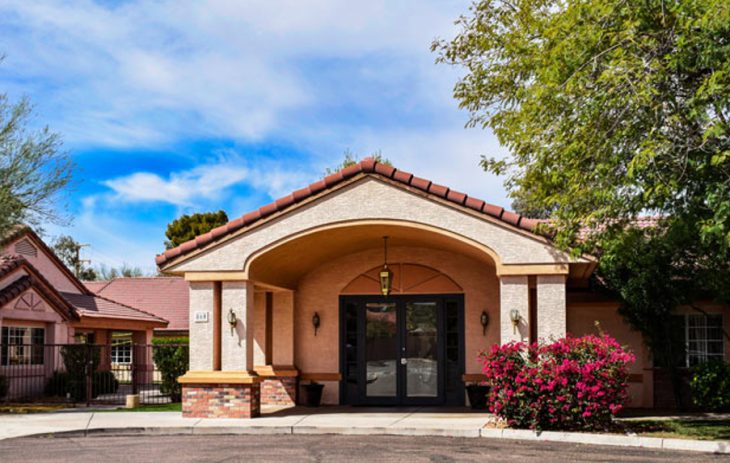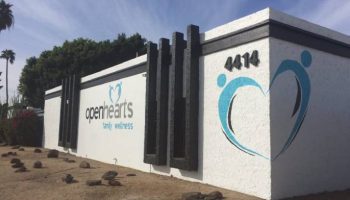About Canyon Vista Recovery Center
If you’re looking for a detox, substance use disorder recovery, and behavioral health center in Mesa, Arizona, you might consider Canyon Vista Recovery Center. They’re located on North Center Street in the heart of Mesa. They have medical detox, residential treatment, and partial hospitalization programs, and they’re accredited by The Joint Commission. They also take insurance from most providers, including TRICARE.
When you’re first admitted to the program, you’ll be psychiatrically and medically assessed. If detox is necessary, you’ll move into the detox program. It’s important to understand that alcohol and opioid dependence are chronic diseases in which you may relapse. Ridding your body of harmful substances better equips you to avoid relapsing.
Their detox program is an inpatient program. You’ll have monitoring to ensure you withdraw comfortably and safely from whatever substances are in your system. Detox is different for everyone and depends on the types of substances you’ve been using. Detox also varies based on how long you’ve been using and the amount of substances used. Most people are in the detox unit for 3-7 days.
If you’re going to use Vivitrol to avoid relapsing on alcohol or opiates, you’ll need to be substance free for at least 10 days. Vivitrol helps people by suppressing cravings for alcohol or opiates. It’s important to note that if you take any drugs while on Vivitrol, it’s possible to fatally overdose.
While you’re in the detox program, you’ll participate in addiction education and identify any co-occurring disorders such as bipolar disorder, anxiety, depression, or schizophrenia. Many people with substance use disorder have co-occurring mental health disorders. It’s good to identify these disorders because understanding them helps you better manage your life and avoid substance use as a coping method.
After you’ve completed detox, you and your treatment team can develop an aftercare plan. Many people continue with an inpatient program, which they offer for 20 days, complete with biweekly equine therapy, dance and music therapy, and gardening, or move to an outpatient program. Detox is just the first step to beginning a sober lifestyle. A former client said their facility was clean and safe to take your first steps into recovery.
Levels of Care
-
Inpatient
Inpatient and residential programs provide round-the-clock medical and emotional support as you live at the treatment facility. This level of care may be recommended if you have severe addictions or mental health conditions since it removes outside distractions and allows you to focus solely on therapy.
-
Outpatient
In outpatient therapy, you’ll attend therapy sessions several times each week while living at home. This is ideal if you have a strong support system and a lower risk of relapse. Outpatient treatment offers flexibility to maintain work, school or family obligations.
-
Aftercare
Aftercare programs provide ongoing support after you complete a rehab program. They may include several components to help you maintain sobriety including therapy, community support groups and relapse prevention strategies. This gives you a network of resources as you reintegrate into your daily life.
-
Dual Diagnosis
Dual diagnosis programs address substance use disorders and co-occurring mental health conditions simultaneously. This integrated approach to care improves the likelihood of long term recovery and stability by addressing the root causes of addiction.
-
Intervention
An intervention is a structured and professionally guided conversation with an individual who is struggling with addiction. During the conversation, family and friends will encourage you to seek treatment. This is often a pivotal step for those resistant to getting help.
-
Sober Living
Sober living homes provide a supportive and substance free environment for you to live in as you overcome your addiction. Residents must follow house rules and support each other's recovery journeys. Sober living fosters accountability and stability during this critical phase of recovery.
Detox Service Setting
-
Inpatient Detox
Inpatient detox occurs in a dedicated treatment facility. You’ll live there around the clock and receive intensive medical support and supervision to help manage your withdrawal symptoms. It is suitable for individuals with moderate to severe addictions as it ensures a stable detox environment.
-
Outpatient Detox
Outpatient detox gives you access to medically supervised withdrawal services while still allowing you to live at home. You’ll attend a clinic for treatment and monitoring. This flexible option is suitable for those with mild to moderate withdrawal symptoms who have strong support systems.
Programs
-
Adult (18+)
Adult programs address the substance use and life challenges specific to adults. Therapists can deliver sessions in individual, group and family settings. Services often include job support and life skills training in a structured environment.
-
Alcohol Detox
Alcohol detox programs offer medical support to help individuals withdraw safely from alcohol. Your care team may use medications to ease your symptoms and provide medical monitoring to address complications.
-
Cognitive Behavioral Therapy
Cognitive behavioral therapy focuses on changing harmful thought patterns and behaviors associated with addiction. You’ll learn healthier coping mechanisms by identifying and replacing negative thoughts. This improves your emotional resilience and decreases your relapse potential.
-
Exercise Therapy
Exercise therapy incorporates physical activity into treatment to promote mental and physical health. Regular exercise reduces stress, boosts mood and enhances your overall wellbeing. This can give you a positive outlook and lower your relapse risk.
-
LGBTQ Friendly
LGBTQ friendly programs create an inclusive and affirming space for recovery. Treatment is sensitive to issues like discrimination and stigma. You’ll receive support and therapy that respects and acknowledges your unique experiences.
-
Men
Men's programs address substance use while also considering the social pressures, family roles and mental health concerns that are specific to men. You’ll learn healthy coping mechanisms as you build emotional resilience and develop communication skills.
-
Opioid Detox
Opioid detox uses medications to ease severe withdrawal symptoms. It also includes medical supervision to help you manage potential complications. These services allow you to stabilize and begin a recovery plan.
-
Rational Behavior Therapy
Rational behavior therapy helps you identify irrational beliefs that contribute to an addiction. Challenging and modifying those beliefs helps you develop healthier attitudes and behaviors. This therapy supports long term sobriety and sustainable recovery.
-
Seniors (65+)
Senior programs address the unique needs of older adults like chronic pain, grief and isolation. Programs include peer support and medical oversight for age related health concerns. The goal is to improve quality of life and promote sober aging.
-
Women
Women's programs offer a safe and supportive space to focus on gender specific issues such as trauma, family roles and mental health conditions. Therapists tailor the sessions to address women's needs and foster empowerment in a healing and nurturing environment.
-
Young Adult (18 - 25)
Young adult programs are designed for individuals who are transitioning into adulthood. Topics of discussion typically include identity, independence and peer relationships. Providers may also offer life skills training and career support.
Payment Options
- Payment Assistance
- Private Insurance
- Self Pay
Accreditations
-
 NAATP
NAATP
-
 SAMHSA
SAMHSA
-
 Joint Commission
Joint Commission
-
 CARF
CARF
Amenities
- Acupuncture Room
- Fitness Center
- Music Room
- Private Rooms
- Yoga Studio
Contact
860 North Center Street
Mesa, AZ 85201





